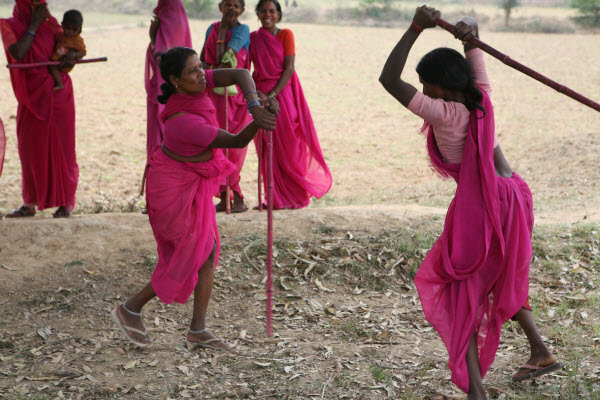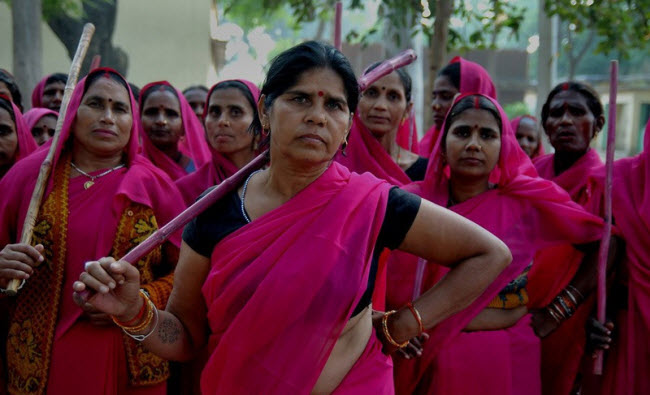If you ever decide to visit Uttar Pradesh in India, you should be aware of more than just the local laws. While police enforcement is one thing, in this region, a unique women’s group known as the “Gulabi Gang” is actively working to maintain justice. Wearing bright pink sarees and armed with sticks, these women have taken it upon themselves to protect women’s rights, ensure justice, and intimidate any potential violators. The Gulabi Gang not only confronts those who mistreat women but also works to protect the vulnerable from abuse, fight corruption, ensure basic rights for the poor in rural areas, and combat deeply rooted societal issues such as child marriage and domestic violence.
The unofficial headquarters of the Gulabi Gang is in the town of Badausa in Banda District, Uttar Pradesh, an area notorious for cases of sexual violence against women. Statistics indicate that this district ranks among the highest globally in terms of being unsafe for women, with over 3,000 rape cases and nearly 16,000 abductions reported annually. Additionally, female literacy rates are alarmingly low at 47%, and harmful traditions like child marriage and domestic abuse are prevalent. The Gulabi Gang was born out of these harsh realities and the perceived inaction of the police. It all started in 2006 when Sampat Pal Devi, a local woman, witnessed a man beating his wife. She intervened and asked him to stop, but he refused and insulted her. The next day, Sampat returned with five other women, and together they beat the man. This incident quickly spread, and more women began approaching Sampat, seeking similar intervention.

As their numbers grew, so did their need for organization. The Gulabi Gang decided to formalize their group, opening membership to women aged 18 to 60 and adopting the pink saree as their uniform, symbolizing femininity and solidarity. Today, the group boasts between 270,000 and 400,000 members spread across numerous outposts in the district. Each outpost is led by a local leader responsible for managing day-to-day activities and resolving minor issues within her area. Any significant problems are reported to the group’s central leadership. Interestingly, while the Gulabi Gang is primarily a women’s organization, they do allow men to join and even participate in their activities. In one notable instance, they supported 7,000 farmers in protests demanding compensation for failed crops.

Over the past 15 years, the Gulabi Gang has been actively fighting all forms of violence against women. They have successfully prevented many child marriages, arranged love marriages, and ensured basic rights for the poor by distributing food, grains, and pensions to widows who cannot support themselves. They also oversee community services, bringing women together to learn self-defense and achieve economic self-sufficiency. In recent years, the group has even begun offering wedding services to reduce costs for brides, including tailoring bridal outfits, catering, flower arranging, and providing henna and makeup services.

One of the most famous examples of the Gulabi Gang’s commitment to defending women’s rights using force occurred in 2007. A man from an upper caste raped a poor woman, and due to his influence, he was not arrested, despite protests from the villagers and the woman’s relatives. The authorities even jailed many of the protesters. In response, the Gulabi Gang accused the police of colluding with the rapist and attempted to free the imprisoned villagers while demanding the rapist’s arrest and prosecution. When a police officer refused to comply, the group used physical force against him to compel him to do his duty. Their tactics often involve physical confrontation, and when that proves ineffective, they resort to public shaming or organizing protests and sit-ins. This approach has helped many victims, like a 17-year-old girl named Shilu Nishad, who was gang-raped and then detained when she tried to report the crime at the police station. The Gulabi Gang organized two large protests outside the police station and the home of one of the rapists, who was a legislative member. Their efforts resulted in justice for the girl. The group has also been active in fighting corruption, exposing government grain shops that sold food meant for villagers on the black market, and forcing electricity officials to restore power cut off to extort bribes from residents.
Although the Indian government passed a law in 2010 allowing greater female political participation by reserving 33% of parliamentary seats for women, the Gulabi Gang continues its grassroots activism. They believe in delivering immediate justice and are wary of potential corruption among female politicians. The group prefers community justice over working with the government or official organizations. Despite occasional clashes with the police and government, authorities acknowledge that the Gulabi Gang’s efforts help resolve many issues and provide much-needed support to the community.
